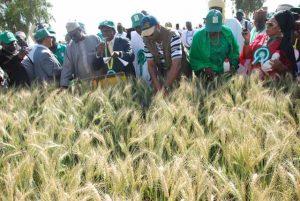Agric. transformation group promote high yielding, heat resistant wheat to curb importation
March 16, 2023292 views0 comments
By Onome Amuge
Technologies for African Agricultural Transformation (TAAT) has announced that intensified plans are underway towards large production of high yielding heat-resistant wheat to create sustainability and address Nigeria’s high dependence on importation of wheat.
Oluwatoyin Adetunji, the value chain specialist at TAAT Clearinghouse, who made this known at the recently held two-day wheat training workshop in Kano,said the workshop’s goal,through the agricultural transformation organisation, is to identify obstacles limiting the Nigerian wheat seed industry and offer solutions for overcoming them.
Read Also:
Adetunji bemoaned the fact that, up until this point, Nigeria has imported at least 95 per cent of its wheat, a situation that has been and continues to drain the country’s foreign exchange.
The value chain specialist, however, remained optimistic that in the not-too-distant future, Nigeria will start exporting high-quality wheat to other countries,following the intensification of research programmes on wheat.
In order to make Nigeria self-sufficient in wheat production and compete with Ethiopia and Sudan, which are both self-sufficient in wheat production, Adetunji listed the challenges currently facing TAAT, including those related to technology and financing.
In addition to identifying the causes and effects of seed mixtures, she noted that the workshop aims to identify the gaps in the seed development process.
According to Adetunji, wheat is very important and the most commonly consumed food globally, as it is used for the production of bread, macaroni, spaghetti, masa, couscous, among other food products.
“Following our commitment and determination, we have, through intensive research programmes developed heat-tolerant materials that can survive in Nigeria,” she said.
Going forward, she said that stakeholders will interact during the workshop to identify specific problems relating to their organisations, adding that technical knowledge will be shared on how to improve the efficiency and effectiveness of the seed sector.

